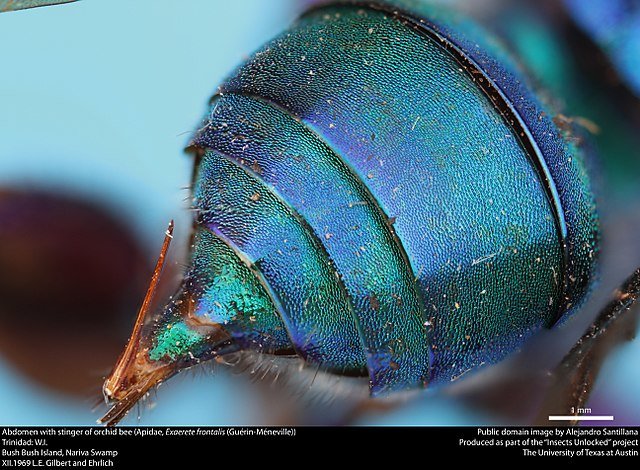What About Bee Stings?

Kim Fellows
When bees and wasps are away from their nests, they aren’t aggressive unless they feel threatened — if they are stepped on or swatted. Otherwise, bees and wasps are likely to sting in defence of their homes. If you are too close to a paper wasp nest hanging in a tree, or too close to a bumble bee nest in a grassy tussock while you are mowing the lawn, you may receive a painful warning not to get any closer. Honey bees have dedicated individuals to defend their hive (guards), and they are the only species to die after stinging mammals with thick skins, such as ourselves. Being aware of pollinator nests and keeping your distance will protect you from stings.
It may surprise you to learn that most bees are not aggressive. Up to 70% of over 850 species in Canada are termed “solitary,” which means a single solitary female bee is working on her own to raise the next generation (in contrast to “social” bees like honey, bumble and some sweat bees, which raise their young together). A solitary bee is much less likely to sting you because she doesn’t have a backup bee to take her place. Many solitary bees are too small to deliver an effective sting, and many are simply not aggressive at all. A tribe of bees known as the Meliponini have lost the ability to sting.
About 1-2% of the overall population, or 600,000 Canadians, are thought to be at risk of anaphylaxis stemming from food and insect allergy. Statistics from 2000 indicate that in that year, you were more likely to die from a truck, bus or train accident. People lacking anaphylactic reactions can safely tolerate 10 stings for each pound of body weight, so the average adult could withstand more than 1,000 stings.
While bees and other pollinators are feeding from blossoms, they are not aggressive, and in fact, provide great opportunities to observe them closely. I have never been stung in seven years of literally shoving a camera in their faces.
Check out Pollinator Partnership No Fear of Stings.
--
Kim Fellows is the co-ordinator of Pollination Canada
Photo of an orchid bee stinger. Creative Commons CC0 1.0 Universal Public Domain
Not yet a member?
An annual membership to Seeds of Diversity gives you access to our seed exchange, seed grow-out programs, and our online news.

We depend on donations to do our work.

Thank you for your support!
